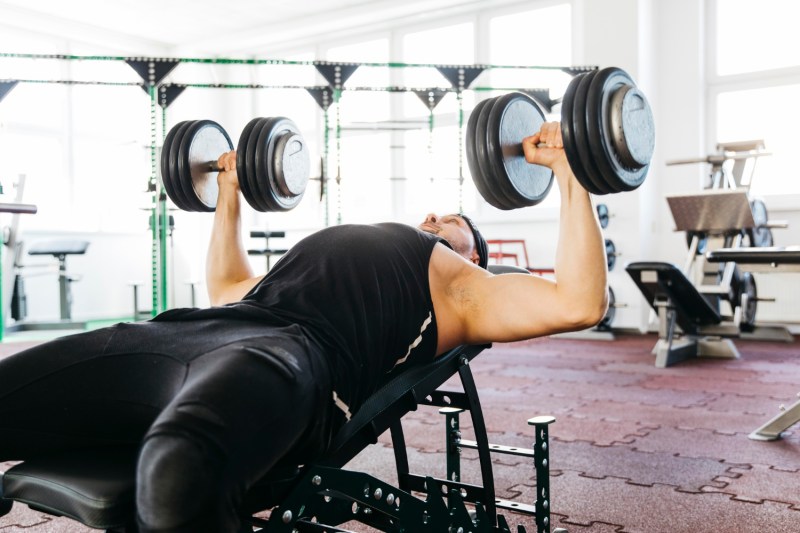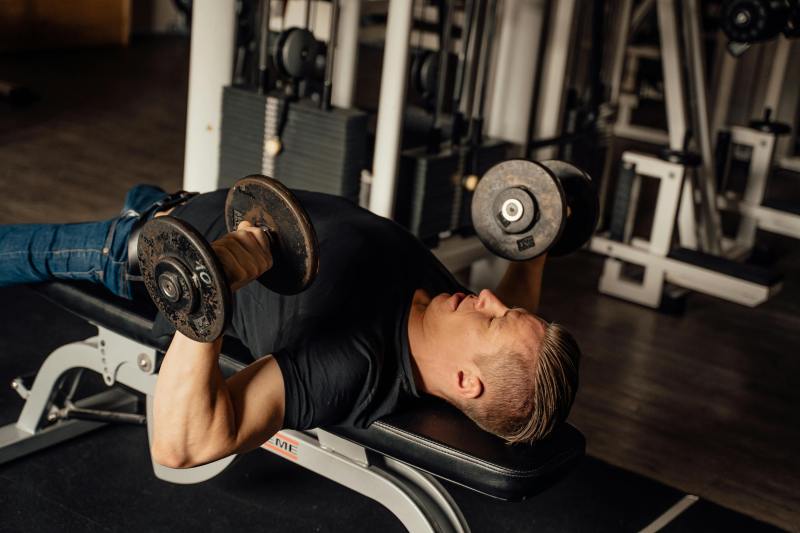The bench press is a classic exercise, as it targets numerous upper-body muscles simultaneously. As a personal trainer, I include the bench press in nearly every client’s program, and I consistently do it myself once or twice a week. So, we know the bench press is beneficial, but are certain variations better than others?
In the gym, you likely have access to both barbells and dumbbells when it comes to your chest days. Keep reading to discover which should win the barbell vs. dumbbell bench press debate!
What are the pros and cons of the barbell bench press?

Pros
- Allows you to lift heavier weights, maximizing strength gains
- Easier to progressively overload by adding small weight increments
- Provides stability, making it accessible for beginners
- Efficient for building upper-body pushing strength quickly
- Standardized movement for tracking progress and testing strength
Cons
- Limited range of motion compared to dumbbells, reducing stretch and contraction
- Can create or reinforce muscle imbalances since both arms work together
- Requires a spotter for heavy sets to ensure safety
- Puts more stress on the shoulders if your form is poor
- Equipment (bench, barbell, weights) takes up more space and isn’t always available
The barbell bench press is excellent for building strength and progressive overload, but it does also come with drawbacks like reduced stability work and safety concerns when lifting heavy.
What are the pros and cons of the dumbbell bench press?

Pros
- Promotes a greater range of motion for improved muscle stretch and contraction
- Trains each side independently, helping correct strength imbalances
- Engages stabilizing muscles in the shoulders, chest, and core
- Safer to drop dumbbells than a loaded bar if you fail a rep
- Versatile, as it can be done with adjustable dumbbells in small spaces
Cons
- Harder to lift as much weight compared to a barbell
- Getting heavy dumbbells into position can be awkward and risky
- Fatiguing stabilizer demands may limit pushing performance
- Progression is trickier if gym dumbbells only increase in large weight jumps
- Less effective for maximum strength testing compared to barbells
The dumbbell bench press allows you to excel at muscle activation, balance, and stability, but you want to keep in mind that it limits absolute strength potential and may feel less practical when you get up there in weight.
Technique, progression, and load potential

When comparing barbells and dumbbells, technique, progression, and load potential differ in key ways. The barbell bench press offers a more stable setup, making it easier to maintain consistent technique across sets. Because both arms move the bar together, lifters can focus on pressing heavier loads without worrying as much about stability. This stability also makes progression straightforward, since small plate increments allow for gradual increases in strength. As a result, the barbell bench press generally has higher load potential, making it ideal for building maximum pressing power.
On the other hand, the dumbbell bench press demands more attention to form, balance, and control. Each arm works independently, which challenges stabilizers but also makes progression slower. Dumbbell sets often increase in larger jumps, limiting fine-tuned progression. However, the greater range of motion and unilateral benefits can translate into more muscle activation and balanced strength development over time.
Which one should you prioritize in training?

Deciding whether to prioritize the barbell or dumbbell bench press depends on your training goals and experience level. If your main objective is to build maximum strength, the barbell bench press should take priority. It allows for heavier loads, smoother progression, and provides a standardized movement pattern useful for tracking performance or preparing for strength sports like powerlifting.
However, if your goal is muscle growth, balance, and joint health, the dumbbell bench press may be the better choice. Its greater range of motion promotes deeper muscle activation, and training each arm independently helps prevent or correct imbalances that often go unnoticed with a barbell. Dumbbells also demand more stabilizer engagement, which improves control and shoulder stability over time.
In practice, most lifters benefit from prioritizing the barbell for strength and incorporating dumbbells for accessory work. Using both ensures a balanced mix of power, stability, and muscle development.
Whether you choose to prioritize the barbell bench press or dumbbell bench press, it may be comforting to note that one NIH study concluded “all bench press variations may stimulate strength gains and hypertrophy of the elbow extensors and shoulder flexors and horizontal adductors.” So, either way, you will benefit.
Frequently asked questions

How much more can you bench with a barbell vs. a dumbbell?
Most lifters can bench press about 15–20% more weight with a barbell than with dumbbells. The barbell provides greater stability, allowing you to push heavier loads. Dumbbells, however, require more stabilizing muscle engagement, which limits maximum weight but promotes balanced strength and reduces the risk of muscular imbalances.
Why is DB bench harder than barbell?
The dumbbell bench press is harder because each arm works independently, demanding more stabilization and control. Unlike a barbell, which links both arms and provides balance, dumbbells challenge supporting muscles in the shoulders and core. This increased demand reduces the weight you can lift but boosts coordination and muscle activation.
Can I build muscle with just dumbbells and a bench?
Yes, you can build muscle with just dumbbells and a bench. Dumbbells allow for a full range of motion and target stabilizing muscles, making them highly effective for strength and hypertrophy. With progressive overload, varied rep ranges, and consistent training, they’re enough to build size and strength over time.




